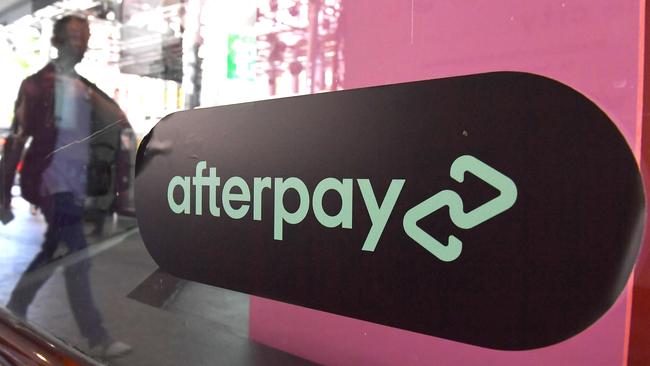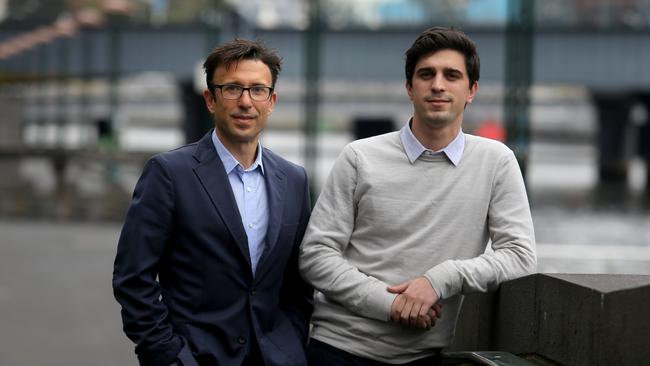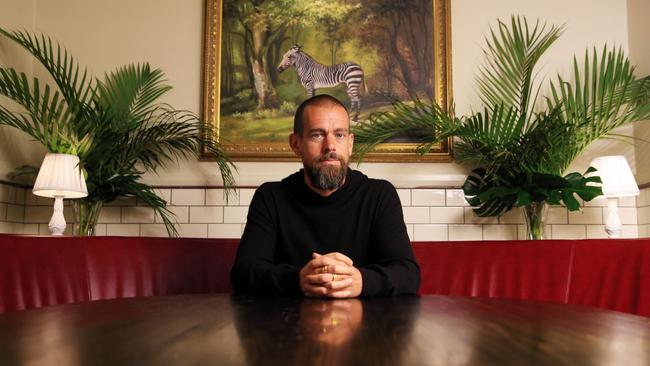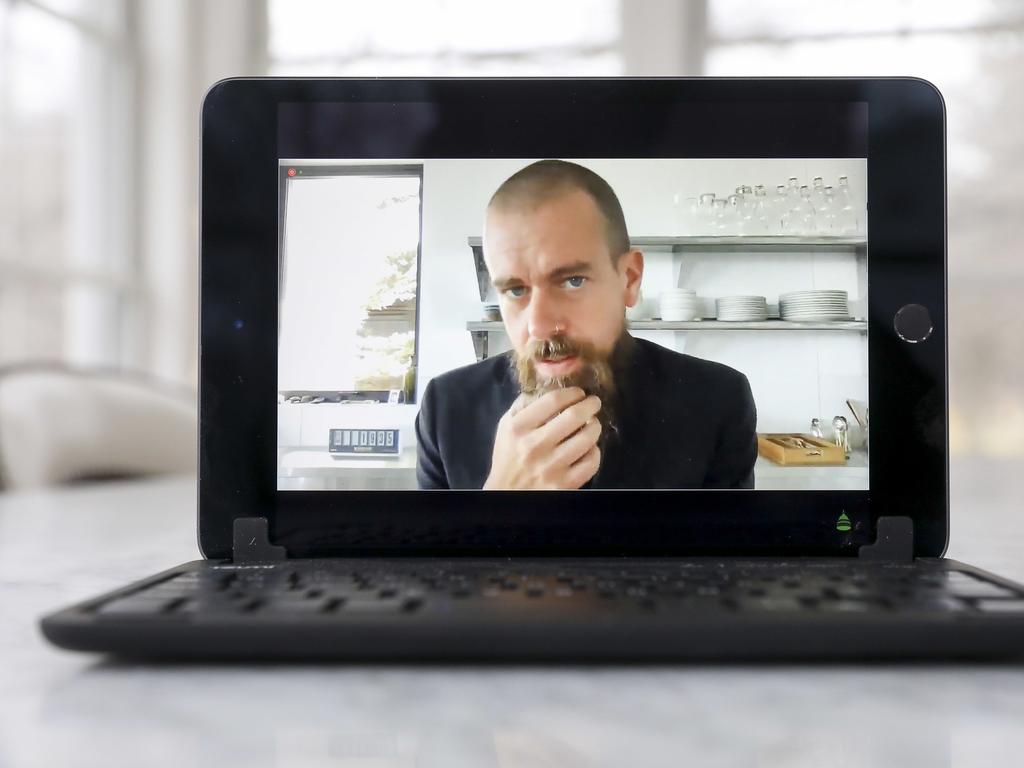Afterpay’s Nick Molnar and Twitter founder Jack Dorsey kindred spirits
In the closely knit world of Silicon Valley, relocated Afterpay co-founder Nick Molnar was always going to cross paths with Twitter founder Jack Dorsey.

In the closely knit world of Silicon Valley, relocated Afterpay co-founder Nick Molnar was always going to cross paths with the legendary Twitter founder and chief executive Jack Dorsey.
As if he’s not busy enough running Twitter and permanently banning Donald Trump after the deadly Capitol Hill riot in January, Dorsey, also CEO of the $US112bn ($152bn) payments company Square, shares Molnar’s ambition to detonate and rebuild the global payments system.
Sure enough, the duo met through a mutual interest in philanthropy not long after Molnar left Australia three years ago to spearhead Afterpay’s growth in the key US market.
Square chief financial officer Amrita Ahuja, who joined Molnar in media calls on Monday to spruik the US company’s $39bn, all-scrip offer for Afterpay, was an even earlier contact.
Molnar is vague about exactly when Square’s superficial interest in Afterpay evolved into something much more serious.
“Those conversations all kind of blur into one,” he tells The Australian, knowing that a blow-by-blow account is to be filed as part of a Square proxy statement due in the next 30 days.
“I really can’t tell you who approached who, or when commercial discussions turned into M&A-style conversations.
“But given the alignment and free-flowing nature of how we’ve worked together, it soon became apparent there was far more value to be jointly created if we were one organisation.”
The word alignment was peppered through Monday’s press releases, investor slides and media calls as promoters highlighted the gains to be made from the nation’s biggest proposed takeover, eclipsing the rebuffed $22bn offer made last month for Sydney Airport.
For the first time since, well, the last time, traditional investment fundamentals have been cast aside in the name of “buy now, pay later” – a reworking of the old-fashioned lay-by concept.

The new juice, powered by smartphones to enable internet browsing on the go, was instalment payments.
By itself, payment in four separate transactions was hardly revolutionary.
However, it captured the Zeitgeist, as millennials, gen Zs and gen Xers spurned the debt traps and heavy interest obligations associated with an increasingly unpopular credit card industry.
Co-founder Anthony Eisen joined forces with Molnar after taking an interest in his Sydney neighbour’s jewellery business, and the pair began to ride the BNPL wave.
It’s been a wild ride as the company established dominance in Australia before taking on much bigger markets in the US and Europe.
Resistance from politicians, regulators and the consumer movement has been a constant feature, and is unlikely to recede.
Concern centres on the absence of credit checks, a tendency to prey on the financially vulnerable to the point where they cut back on essential spending, and Afterpay’s well-documented skirmish with financial intelligence agency Austrac.
One insider puts up Afterpay chair Elana Rubin as an “unsung hero” who convinced Eisen and Molnar that the global land grab with other BNPL platforms for consumers and merchants had to be tempered until the right systems and processes were in place.
“Every dollar of capital is precious when the land grab’s under way, but some portion had to be redirected to build the right infrastructure,” he says. “Elana was a voice of balance in a group of driven entrepreneurs.”
As founder-driven businesses, albeit seeking to disrupt different parts of the payments value chain, Afterpay and Square regularly appeared on the other’s radar screen. The mutual regard was well-founded and is evident in the plan to integrate Afterpay into Square’s two business units – Seller and Cash App.
Afterpay will be combined with Seller’s online and in-person checkout process, and its 100,000 global merchants will help to accelerate Square’s growth with bigger sellers and expand into new countries.
Meanwhile, the Australian group’s 16 million consumers will be able to manage their instalments and repayments directly in Cash App, helping to drive repeat business.
They will also get the benefit of Cash App’s financial tools, including money transfer, stock and bitcoin purchases and Cash Boost.
Square’s Ahuja says there are “tremendous” growth opportunities for Afterpay under Square ownership, with online payments likely to grow to $US10 trillion by 2024. While BNPL’s penetration of the market has barely reached 2 per cent, younger consumers are switching away from traditional credit to BNPL due to a preference for “predictable and transparent” borrowing.

“Millennials and gen Z are about 45-50 per cent of the labour force, but only make up 25-30 per cent of the spend,” she says.
“We expect those numbers to converge over time.
“From a merchant perspective, merchants are shifting to omnichannel, meeting their buyers wherever they are, whether in person, online or on mobile.
“BNPL is a key means for merchants to increase conversion, drive higher average volumes and find new customers.”
Square clearly sees significant upside, otherwise it wouldn’t be paying an extraordinary 40 times Afterpay’s 2021 revenue.
It begs the question of whether, in 10 years’ time, the Square/Afterpay deal will be seen as typifying a bull market in tech stocks, with the claimed value creation mostly illusory.
Ahuja responds that customer numbers and cross-selling are growing fast for both companies, leading to strong unit economics.
Incremental profit margins are also buoyant and would drive sustained profitability over the longer term.
“We see that Afterpay has many of the same dynamics and business fundamentals as Square – positive GMV (gross merchant value), retention of their merchants, payback from sales and marketing and returns on investment,” she says.
“Those are dynamics we can jointly invest behind and ultimately, we believe, to long-term, compounding and profitable growth.”
Molnar and Eisen are both along for the ride, saying they will accept Square stock for their respective $2.7bn and $2.6bn stakes in Afterpay.
In return, however, they shed their status as founders and become employees of a larger group.
You wouldn’t expect Molnar to have any public reservations, particularly at this stage. “As we’ve got to know Square, it’s really clear that the entrepreneurial culture runs so deep through the organisation,” he says.
“So from Ant (Eisen) and my perspective, it was really important to not just believe in the long-term strategic value but also to believe in the excitement we feel right now compared to what we felt on day one. It’s all a testament to the culture that Jack has set and the ability for entrepreneurs to function in a really fast-growing environment.”







To join the conversation, please log in. Don't have an account? Register
Join the conversation, you are commenting as Logout